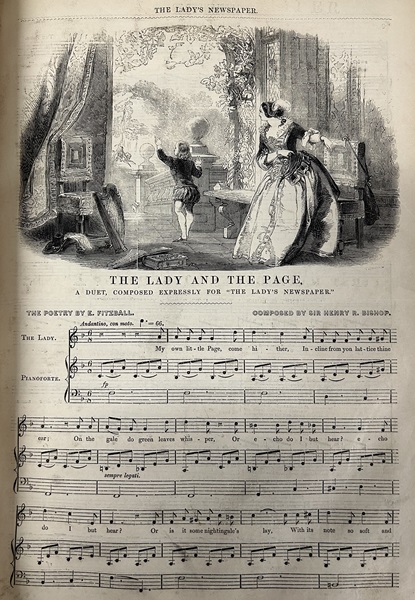
Sheet music for "The Lady and the Page", from The Lady's Newspaper, circa 1850.
This library of more than 3,000 printed items was the property of the Reverend Thomas Wigan (1743-1818), minister of Wribbenhall, Worcestershire. He bequeathed it to the nearby town of Bewdley, where it served as a public library.
The collection is a very good example of an educated and cultured eighteenth-century gentleman's library. It contains volumes of theology (with a substantial run of rare seventeenth and eighteenth century pamphlets), history, law, science and literature.
The collection includes:
- copies of the revised second edition of De Architectura libri decem (published in Florence in 1522 with 140 woodcut illustrations) by Marcus Vitruvius, the first architect, which is the source of almost all that is known about classical Greek and Roman architectural theory and practice
- a first edition of Pisgah-Sight of Palestine, a historical and geographical description of the Holy Land (1650). This includes an engraved plate of subscribers' arms shown as standards, twenty double-page regional maps and seven double-page plates, by Thomas Fuller. As Chaplain in Extraordinary to Charles II, Fuller sought to support an ideal balanced constitution of monarch and parliament with a tolerant established Church
- the first edition of Paradise Lost (1668) with the fourth state of the title page and the introductory material by added Milton to help stimulate sales
- the first edition of Gulliver's Travels (1726), which sold out in less than a week. Swift had secretly delivered the manuscript to his publisher Benjamin Motte. Motte cut or altered offending passages and inserted material in defence of Queen Anne in order to avoid prosecution for libel
- a first edition of Matthew Tindal's Christianity as old as the Creation; or, the gospel, a republication of the religion of nature (1730), the seminal statement of Deism, in which he argues against scriptural revelation: “God designed all Mankind should at all times know, what he wills them to know, believe, profess, and practice; and has given them no other Means for this, but the Use of Reason.”